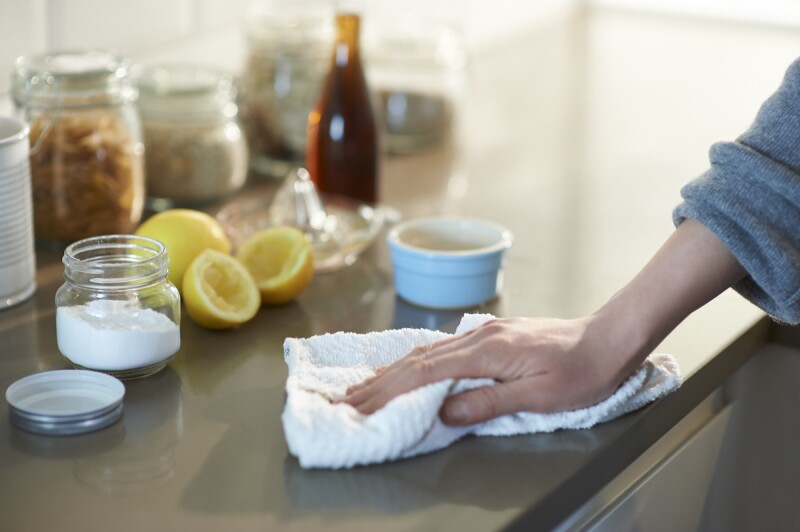Don’t sleep on the benefits of DIY cleaning products — especially in the bedroom! Not only are they easy to whip up and cheaper than store-bought cleansers, but they also lack the harsher ingredients that can irritate and overpower our senses as we drift off to sleep.
“Noxious smells, like ammonia or bleach — which can be found in common store-bought household cleaners — can trigger a physical reaction that might keep you up,” says Dr. W. Chris Winter, author of The Rested Child and The Sleep Solution. “A negative scent will not be conducive to sleep, while a pleasant scent like lavender, or something else you enjoy, can actually help you create a road map for sleep.”
That’s where homemade cleaners and scent sprays come in handy. They can be customized to suit your preferences, while still being effective against common household grime.
Plus, these simple recipes from Courtenay Hartford, a cleaning expert at The Creek Line House, work for any room in your home. You’re just a spritz away from a cleaner and more pleasant-smelling bedroom.
4 recipes for natural DIY cleaners to make at home
Once mixed, these cleaners will last about four to six weeks.
Homemade all-purpose vinegar cleaning solution
Diluted vinegar is a superb natural cleaning solution. The addition of bright-smelling citrus oil will offset the strong vinegar smell and give this blend even more cleaning strength.
Use on: Painted wood surfaces, walls, trim
Don’t use on: Natural stone, lacquered wood, or unpainted wood.
Ingredients:
- ½ cup white vinegar
- ½ cup water
- 20 drops lemon essential oil
Spray on your surfaces and wipe away with a towel or microfiber cloth. Lemon oil helps with more than just scents, it de-gunks your surfaces too.
Homemade floor cleaner
Your floors amass a lot of germs, even if you are a shoe-free household. This blend uses diluted Castile soap, a non-toxic blend of olive oil and sodium hydroxide, with essential oil.
Use on: Wood floors, laminate, vinyl, tile
Don’t use on: Carpet
Ingredients:
- 2 cups water
- 1 tsp. Castile soap
- 10 drops orange essential oil
Combine in a spray bottle, spray and mop up. Don’t soak the floors or let the cleaner sit, as it could damage the surface. If you have scratched wood floors, condition the floor with flax oil as a separate treatment to help minimize scratches.
DIY stain remover
You probably have everything you’ll need already on hand for this easy stain remover. It’s great for organic stains like grass or blood.
Use on: Most fabrics like cotton, synthetics
Don’t use on: Wool or cashmere
Ingredients:
- 1 tbsp. dish soap
- 2 tbsp. hydrogen peroxide
- 1 tbsp. baking soda
Mix to form a paste, and gently spot treat on items. Use an old toothbrush to work the paste into the fibers. Let the mixture sit for five minutes and launder per the item’s washing instructions.
Natural freshening spray
Vodka is the secret ingredient in this spray, which is great for freshening linens and furniture. Use an amber spray bottle to extend the lifespan of the essential oils. A combo of lavender and lemon imparts a clean laundry scent, while peppermint and eucalyptus smell invigorating.
Use on: Bedding, linens, and upholstered furniture.
Don’t use on: Highly visible areas without first doing a color fastness check on a small test area.
Ingredients:
- 6 oz. vodka
- 6 oz. water
- 30 drops essential oil, such as lavender, lemon, peppermint, or eucalyptus
Combine in a spray bottle and spritz lightly on surfaces of your choosing to freshen.
Keep a cleaning routine to minimize dirt and clutter
“Since [the bedroom] is not a public space, it quickly becomes a dumping ground for clutter, which makes it harder to clean properly and thoroughly,” says Hartford. That dumping ground can even spill over into our psyches, as seeing clutter before bed and in the middle of the night can trigger anxiety about all the tasks that remain undone.
Winter adds that keeping your bedroom clean can also help prevent dirt and dust from triggering asthma or breathing issues that can impact your sleep.
How to help establish a regular routine for both deep cleaning and in-between maintenance:
- Do a deep clean once a week. It won’t be that bad if you stay on top of it! Keeping the room clean during the week will also help minimize the work you have to do on weekends. This includes dusting, vacuuming, wiping down surfaces, and washing bedding when needed.
- Work from the top down. Whenever you’re cleaning or dusting, work from the top down so you’re not getting dirt and dust on surfaces that you’ve already cleaned.
- Allow your bed to air out. When you wake, pull your covers back and go about your morning routine, then come back and make your bed. It lets moisture dry instead of getting folded into the bed. “Just don’t use this as an excuse to skip making your bed,” says Hartford. “It can lead to other routines of neglect.”
- Keep your room clutter-free. Not only does it allow for easier surface dusting and cleaning, it helps keep your mind clear too! “Keep your bedroom simple and uncomplicated,” says Winter. “A place for only the essentials. Your bedroom should feel like a sanctuary, somewhere you’re excited to go at the end of the day.”
- Pay more attention to your bedding. Use a breathable pillow and mattress protector, especially if you're a hot sleeper advises Hartford. Also, swap in new pillowcases even more frequently than you change your sheets, they get dirty faster since they're exposed to dirt and oil on your face.





